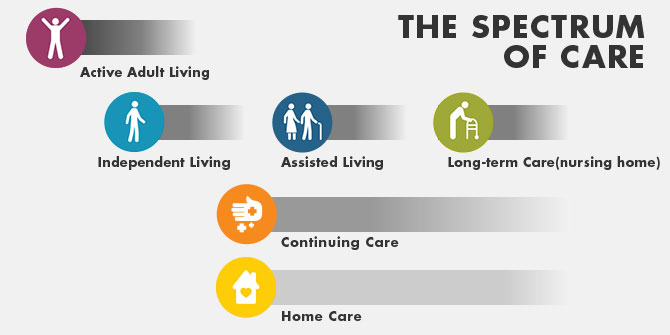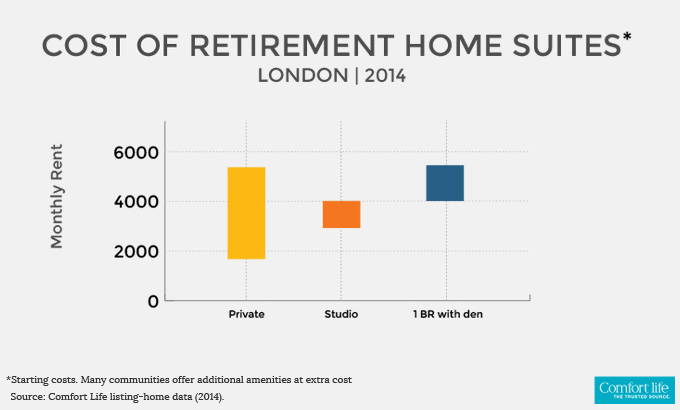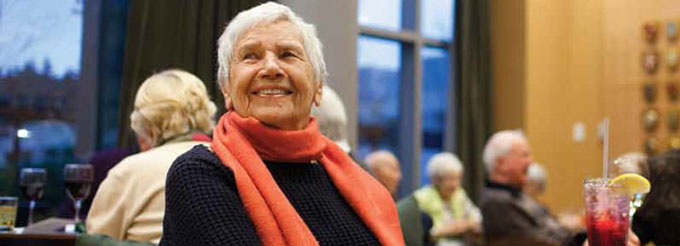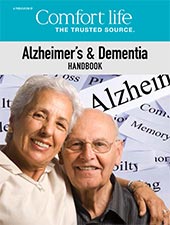Lists of reports on this page:
Find care details, insights, and insider perspectives gained from 20+ years of helping seniors and families.
What to know about this topic:
- Types of senior care in London
- How much does a retirement home in London cost?
- Medical and safety services
- Senior living in London
- Getting around London
- Availability of retirement homes in London
- How to choose a retirement home in London
- London retirement community regulations
London Ontario is a city full of art and history and surrounded by natural beauty. London offers not only many different options for retirement accommodations, but also ample opportunities for active seniors. Those seniors who have a little more trouble getting around can also feel welcome in London; In 2010, it became the first city in Canada to join the World Health Organization (WHO) Global Network of Age Friendly Cities.
This is your guide to finding the right retirement community and care in London (and southwestern Ontario, including Woodstock, Grand Bend, Strathroy, Lucan, Chatham, and Leamington). Read our complete guide to senior living in London.
IN-DEPTH REPORTSRetirement communities in London
Amica London
This uniquely luxurious London, Ontario retirement home offers elegant dining, indoor fitness facilities, scenic walking trails and many other features for active seniors.
Lifestyle Options: Independent Living, Assisted Living
Sifton - Riverstone
Riverstone supports an independent retirement lifestyle in a brand-new community built for you. Choose from retiree apartments, one-floor villa townhomes and retirement suites coming Fall 2023!
Lifestyle Options: Independent Living
The Village of Glendale Crossing
A true retirement hub featuring independent Living Apartments with full kitchens, Retirement Apartments, Full Service Retirement suites with walk out patios, Assisted Care, Memory Care and LTC.
Lifestyle Options: Apartments, Independent Living, Assisted Living, Memory Care, Long-term care
Sifton - Dorchester Terrace
Dorchester Terrace offers area seniors a variety of suite choices, wellness support services, medication administration, housekeeping services, physiotherapy and daily dining in an open restaurant-style dining room.
Lifestyle Options: Independent Living
Sifton - Richmond Woods
A desirable retirement residence in London, Ontario, including 130 suites with extensive amenities designed to provide the ultimate in retirement living. Proud winners of the "Best of London in Retirement Living 2020!"
Lifestyle Options: Independent Living
Sifton - Longworth
Voted London's Best Retirement Residence seven years running! We promote our passion for seniors living well by offering choices for an active, wellness focused lifestyle with the security of knowing help is at hand.
Lifestyle Options: Independent Living
Oakcrossing Retirement Living
Welcome to Oakcrossing Retirement Living, where we have a fresh perspective on senior living. Offering a large variety of studios, one- and two-bedroom suites with both retirement and assisted living services available.
Lifestyle Options: Independent Living, Assisted Living
Types of senior care in London
London’s retirement homes focus on providing a range of options to seniors and include the full spectrum of care: active adult, independent living, assisted living, and Alzheimer’s care options (see image below).

Active Adult Living
Active adult communities may consist of single-family, /mobile or manufactured homes as well as cluster or condo style housing. These communities are typically gated subdivisions restricted to mature adults, often situated on or around a golf course, country club or other pristine setting. An active adult community is designed for healthy adults who are beginning their retirement and are looking for accommodation, services and care in a secure environment amongst a community of peers.
Independent and Assisted Living
Retirement homes with both independent and assisted living services in their residence offer seniors a continuum of care. Active, healthy seniors can choose an independent living suite and take advantage of the full dining, light cleaning and other services. For seniors with greater health demands an assisted living suite provides access to a higher level of medical care and staff time for health and other personal needs. The advantage of choosing a retirement home that offers both independent and assisted living is that seniors can remain within a community that is familiar and comfortable to them as they age. They also continue to rely on the support of staff, friends and peers as their health demands change.
Long-term Care
For seniors with dementia or Alzheimer’s disease an Alzheimer’s care community will provide 24-hour, customized care. These residences focus on preventing further cognitive decline while ensuring residents remain safe and comfortable in a setting that is familiar and home-like. At one time, these were popularly called "nursing homes" but this phrase is no longer used in the industry.
To narrow your search for nursing and other care in London, click on types below:
How much does a retirement home in London cost?
The monthly rent of a retirement home in London depends greatly on the type of suite and level of care you choose. The average rent in London is $3,741.40 a month for standard care, which is slightly higher than the provincial average of $3,204.
The chart below shows the range of costs for different suite-types, based on the retirement communities listed on this page.

Note that renting is not the only way to finance a retirement community suite -- you can also buy or life-lease. But renting is the most common form of financing, and it's usually the form that's offered by communities.
Retirement savings, pension, CPP, OAP and other income sources like the sale of the family home are the most common ways for seniors to pay for retirement care. For those in need of financial help the city of London’s Affordable Housing Program creates new homes for low-income seniors. For more information, visit the City of London's website.
Seniors with high medical or prescription expenses may want to consider applying to the Trillium Drug Program (TDP). TDP helps seniors who have high prescription drug costs relative to their household income. Seniors over the age of 65 years old who live in Ontario and have a valid Ontario health card are able to apply.
Medical and safety services
Some examples of health and wellness services provided in independent, assisted and Alzheimer’s care residences include:
• An on-site doctor, or a doctor who visits residents on a regular basis
• On-site nursing staff, often available 24/7
• An on-site pharmacy and medication assistance services
• Exercise programs with access to a personal trainer
• Physiotherapy
• Preventative wellness programs
• Recuperative programs
• Dietary and nutritional programs
• Assistance with daily living activities including bathing, dressing, nutrition and mobility
• Assistance with lifestyle maintenance including outings, social engagements and pet care
• Continence management programs
• Palliative care homes and services
In addition to medical programs, physical, emotional, social and cognitive health care programs are also important for seniors to participate in. Having a healthy diet and staying active are all part of staying physically healthy, and retirement residences that offer meals and sport facilities often have a dietician and activity co-ordinator on board to help residents live a healthy lifestyle.

When it comes to safety, London homes have features that are specially designed to minimize risks and make everyday activities easier. Both assisted living and long-term care residences are equipped with emergency call systems that will immediately alert staff to a fall or other emergency. Three piece bathrooms can include oversized showers (often with seating) heat lamps and grab bars. Every home will have sprinkler systems in each room, and most are built as non-combustible concrete structures to greatly reduce the risk of fire.
Those homes which assist patients with Alzheimer’s and dementia offer more extensive safety features, such as motion-activated night lights and secure rooms and floors that are monitored 24 hours a day.
Outside help
While retirement homes will provide much of the care needed by aging seniors, sometimes outside help is needed. The advantage of being in a home is staff will help manage and facilitate this outside help.
London has several prominent health care facilities that serve the area including St. Joseph’s Hospital, the University Hospital at Western Ontario, Victoria Hospital and South Street Hospital. London Health Sciences Centre has locations scattered throughout the city including sites across the three before-mentioned hospitals. The Middlesex-London Health Unit and London Regional Cancer Centre also serve seniors in the community and a number of chiropractic care as well as physiotherapy and massage therapy centres are located around the city.
The Council for London Seniors is known as the voice for seniors in the London area. This non-profit senior advocacy group speaks up on behalf of seniors around the London area and is open to seniors to apply to join the committee and have their voice heard.
Whether living in a retirement residence or at home, seniors as well as caregivers can take advantage of many outside organizations dedicated to senior health such as the Alzheimer’s society of London and Middlesex.
Home health-care and caregiver services are not difficult to find in London. There are a number of private companies that offer companionship, housekeeping and personal care services for seniors living at home in the London area, and resources for care-givers can be found here. Many retirement homes also offer overnight respite to seniors to provide caregivers with relief and seniors a night in a home away from home.
Under three year action plan to turn London into and age-friendly city, the Age-Friendly Network was also founded in 2013. The network now has over 80 members and works in committees to make London more accessible and involve seniors in the decisions made in terms of infrastructure.
Senior living in London
Seniors in London who live alone may feel like they are empowered by doing so, but there is a lot of data that points to the fact that living alone has adverse health effects. According to some studies, loneliness is just as bad for you as obesity or smoking. Art is one senior who was very comfortable admitting that, after his wife died, he “didn’t like living alone.” Some feel comfortable on their own, but even then this comfort zone can blind you to possibilities.
After moving into a retirement community, he found a whole new life. “It’s really good living here,” he says. He made friends in the community (Oakcrossing, listed above) and his life is markedly better than before. It helps that Art has the right attitude, too. “You develop friendships over time here, for sure. But, for example, when somebody comes late for dinner and somebody new sits in their place that’s an opportunity to get to know someone new, too.” You can read more about how Art recaptured happiness at this London community. We also urge you to listen to seniors testify to the value they get out of local senior living communities in London.
Certainly, one of the benefits of living in a retirement community is the social focus. Retirement homes not only provide residents with a variety of activities within the residence, but also organize outings to concerts, entertainment, movies, games, gardening and other social activities outside the residence.
Retirement homes in and around London tend to take advantage of the numerous theatres and art galleries in the city, often through planned trips with a group of residents. Some of the most popular events in London are the Western Fair and the Home Country Music and Arts Festival, both listed on FEO’s “Top 100 Events in Ontario” list.
Social activities are also available inside retirement communities or nearby community centres. The Kiwanis Seniors’ Community Centre has a number of fun and exciting activities for seniors who are 55 years of age and older, such as line dancing, shuffleboard, a stained-glass program, billiards and bingo. The Horton Street Senior’s Centre also offers tai chi and aquafit classes, access to a fitness room, and organizes special events and day trips for members.

As for cognitive health, educational classes in many subjects, most often art and dance, are offered in retirement residences for cognitively healthy seniors that want to keep their brains fit, and special therapies are available to those with cognitive impairments.
The Museum of Ontario Archaeology is a popular destination for seniors who enjoy museums and Museum London has Adult Art + Leisure Classes including instruction in watercolour, ink, painting and photography techniques. Western University (formerly the University of Western Ontario) offers classes for seniors and the Thames Valley District School Board has a Rediscover Learning in London program for seniors and adults interested in continuing educational pursuits.
A large part of a healthy lifestyle is also spending time in the outdoors. London has lots of opportunities to get active outside, and retirement homes often take residents on trips to beautiful outdoor sights.
Victoria Park is a popular destination for active seniors and free walking tours are available Saturday morning for seniors through Museum London. The London tourism board offers the community a tree trunk tour, which takes seniors to enjoy the beauty of designs carved into London’s tree trunks. London’s parks are also wonderful places to get some fresh air and take in the gardens. Gardeners can take advantage of membership benefits of the Garden Club of London.
With close proximity to Grand Bend, one of Ontario’s most popular beaches (also, one of Ontario's best small towns), seniors who love to sail, fish, boat, or just enjoy the sun and sand will enjoy being nearby.
Getting around London
For active, independent seniors who want to get around London on their own, the London Transit Commission provides senior tickets and passes at a reduced price for the regular fare. For the same rate, those with reduced mobility and disabilities are eligible for specialized services, such as a community bus. This bus is an accessible vehicle that will shuttle small groups of people to desired locations such as retirement residences and community centres, and will deviate from its route to accommodate patrons. An application is necessary. For a higher rate, but more convenient times, there are also a number of private companies that offer seniors door-to-door transportation services.
Getting around London is getting easier and safer for seniors with each new feature the Age-Friendly Network plans to implement in the city. Increased snow clearance, better readability of signs and distance markers along trails to help provide information in case of an emergency are all part of this initiative. Town hall meetings to educate seniors about transportation options and an easy-to-use website are also in the works.
Availability of retirement homes in London
Ontario’s retirement homes are well regulated, safe and welcoming – unfortunately this also renders vacancy rates relatively low. Over the last few years, the vacancy rate in the province has dropped to about 13 percent.
Even once you've made the decision to live in a retirement home, you may have to spend time on a wait-list before being accepted. Certain factors will inform the length of wait times:
- Crisis placement (if someone’s safety poses immediate risk)
- Type of accommodation: basic, semi-private or private or secure floor (Private or semi-private are more expensive but have shorter wait-times)
- Gender
- Medical care needs i.e. tube-feeding
- Unit designation- secure, non- secure
Calling on the homes you're interested in is the best way to get information on specific wait-times.
How to choose a retirement home in London
Many seniors and their families wait until a time of crisis until they begin to consider retirement homes. Searching during a difficult time can limit your options and only increase stress.
So it's important to get clear as soon as possible on your thoughts around senior living and retirement homes. For more points to consider and some common questions and concerns about retirement homes, please visit our page for seniors considering a retirement home.
Choosing a retirement home is a process that requires thought and pre-planning, but it doesn’t have to be stressful.
You need to first think about:
- What you want
- What you need
- What you can afford
- Your preferred location
How to Choose a Retirement Community from Comfort Life on Vimeo.
The next step -- assuming you are keen on London -- is to looking for potential residences in the area. Use our advanced search to create a shortlist and arrange meetings and tours with the staff.
Download our eBook on the ultimate retirement tour guide for advice on what to ask and look for one tours.
Remember to ask about overnight stays -- some will let seniors stay overnight in a guest suite to get a better idea of what it’s like to live in the community.
When picking a home, ensure your:
- Medical needs are met
- Residence can grow with your needs as your activity, medical and financial circumstances change over time
- Finances are in order. Remember to factor rent and cost of living increases into your calculation
Finally, when thinking about costs, use our retirement calculator to get an idea of what you’ll be able to afford in your retirement.
London retirement community regulations
When searching for a retirement home, seniors and their families often wonder how they will know for sure that their new home will always be a safe and friendly environment. In order to ensure resident safety, retirement communities in London and across Ontario are subject to the Retirement Home Regulatory Authority (RHRA) , which was created under the Retirement Homes Act of Ontario in 2010. In order to be licensed, retirement homes must first receive approval from the RHRA in order to operate, and must undertake ongoing inspections by the RHRA to ensure they continue to comply with licensing requirements and safety standards. Seniors and their families should check the RHRA standing of any retirement home they are considering.
Many retirement homes in London are also members of the Ontario Retirement Communities Association (ORCA), which is a voluntary association for retirement homes throughout Ontario. When a retirement residence is a member of ORCA, you know it is operating with due diligence.
In addition to accreditations and the regulations set by the RHRA, the Long-Term Care Homes Act, 2007 governs all long-term care homes in Ontario. The act requires residences to provide safe, consistent and high-quality resident-centred care and makes sure residents feel at home, are treated with dignity and respect, and have the health care services they need available to them.




